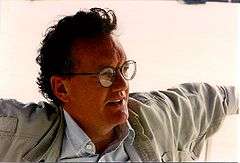George Hedges

George Reynolds Hedges (February 26, 1952 – March 10, 2009) was a lawyer with a list of celebrity clients including Mel Gibson and David Lynch who gained attention in the field of archeology for his discovery of the ancient city of Ubar.[1][2][3][4]
Biography
Hedges was born in Philadelphia on February 26, 1952, and attended the University of Pennsylvania there, where he earned bachelor's and master's degrees in the classics. Hedges used his vocal talents to pay for college by working as a wedding singer. After graduating in 1975, he went to Greece to attend the American School of Classical Studies at Athens, where he did a fellowship.[1]
Law
Returning to the United States, He attended the University of Southern California Law School where he was awarded a degree in law in 1978.[1] He clerked for a judge on the United States District Court for the Central District of California following graduation.[5] Thereafter, he joined the firm of Kaplan, Livingston, Goodwin, Berkowitz & Selwin before going off on his own, establishing the firm of Hedges & Caldwell in 1988. He was hired to join the Quinn Emanuel (now Quinn Emanuel Urquhart Oliver & Hedges) law firm, as part of its effort to increase its Hollywood presence.[1]
An active Hollywood lawyer, Hedges listed one of his favorite cases as one that allowed super-agent Ed Limato, a partner and co-president at International Creative Management, to leave the firm and take clients including Richard Gere, Mel Gibson, Steve Martin and Denzel Washington, despite a non-compete clause that would have prevented him from staying in the business.[1]
He obtained a $6.5-million judgment for director David Lynch against CiBy 2000 for an unreleased film, making it one of the largest such judgments in a case in which talent is not paid.[1]
Hedges worked for 20 years on a pro bono basis on behalf of Adam Miranda, who had been given the death sentence after being convicted of two murders. Arguing that a confession to one of the murders had been withheld by the prosecution, the California Supreme Court decided in May 2008 to overturn the death sentence and change it to life in prison.[1] An editorial in the Los Angeles Times credited Hedges for his persistence in finding the evidence that another man had confessed to the murder that had been used to justify the death penalty for Miranda, lamenting the fact that "Most of the 669 people on San Quentin's death row aren't nearly as lucky".[6]
Los Angeles named him a "California Super Lawyer" and the Hollywood Reporter selected him for its list of the Top 100 Power Lawyers.[1]
Ubar
After a conversation with filmmaker Nicholas Clapp, Hedges learned about the lost city of Ubar, a major hub in the ancient trade of frankincense over 3,000 years ago. Clapp's training in the classics and knowledge of archaeology led him to become involved in the quest to find a place that many had unsuccessfully searched for before and that many thought didn't exist.[1]
The two worked together with Jet Propulsion Laboratory scientists Ronald Blom and Charles Elachi, who were able to locate NASA photographs that showed traces of trade routes used by caravans in southern Oman. The locations where these routes intersected were identified as locations to be investigated as sites of Ubar.[1]
Together with archaeologist Juris Zarins of Southwest Missouri State University, they traveled to Oman and found a site near a present-day settlement of Shisr in the Rub' al Khali in early 1991. Excavating beneath an ancient fort, they found a limestone cavern into which the fort collapsed after an earthquake. In subsequent years, satellite imagery was used to find similar sites in southern Yemen located at the intersection of caravan routes that were also found to have forts similar to the one found at Ubar.[1]
Personal
Hedges died at age 57 on March 10, 2009 due to melanoma, at his home in South Pasadena, California. He was survived by his wife, Christy Shonnard Hedges, and his two sons George Shonnard Hedges, a film editor, and Duncan Fox Hedges, a USC Law student.[1]
References
- 1 2 3 4 5 6 7 8 9 10 11 12 Maugh, Thomas H., III (March 13, 2009). "George Hedges dies at 57; celebrity lawyer was also a noted archaeologist". Los Angeles Times. Retrieved March 19, 2009.
- ↑ Saperstein, Pat (March 11, 2009). "Attorney George Hedges dies". Variety. Retrieved March 19, 2009.
- ↑ Miller, Stephen (March 20, 2009). "Hollywood Legal Rainmaker Helped Discover Long-Lost Arabian City of Ubar". The Wall Street Journal. Retrieved March 21, 2009.
- ↑ Hevesi, Dennis (March 30, 2009). "George Hedges, Lawyer Who Explored Middle East, Dies at 57". The New York Times. Retrieved March 31, 2009.
- ↑ Staff. "George Hedges", The Daily Telegraph, March 17, 2009. Accessed March 19, 2009.
- ↑ Editorial. "A death sentence voided", Los Angeles Times, May 7, 2008. Accessed March 19, 2009.